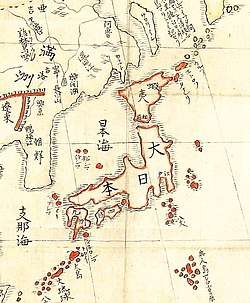Nin'an
Nin'an (仁安), also known as Ninnan, was a Japanese era name (年号,, nengō,, lit. "year name") after Eiman and before Kaō. This period spanned the years from August 1166 through April 1169.[1] The reigning emperors were Rokujō-tennō (六条天皇) and Takakura-tennō (高倉天皇).[2]
| History of Japan |
|---|
 |
Change of era
- February 3, 1166 Nin'an gannen (仁安元年): The new era name was created to mark an event or series of events. The previous era ended and a new one commenced in Eiman 2, on the 27th day of the 8th month of 1166.[3]
Events of the Nin'an era
- 1168 (Nin'an 3, 2nd month ): Rokujō was deposed at age 5, and he received the title Daijō-daijin tennō.[4]
- March 30, 1168 (Nin'an 3, 19th day of the 2nd month): In the 3rd year of Rokujō-tennō 's reign (六条天皇3年), the emperor was deposed by his grandfather, and the succession (senso) was received by his cousin, the third son of the retired-Emperor Go-Shirakawa. Sometime thereafter, Emperor Takakura is said to have acceded to the throne (sokui), and he is proclaimed emperor.[5]
- April 29, 1168 (Nin'an 3, 20th day of the 3rd month): Takakura succeeds Rokujo on the Chrysanthemum Throne.[6]
gollark: kitwho version
gollark: kitkit
gollark: kitwho Kit_ten
gollark: kitwho
gollark: kitping
References
- Nussbaum, Louis-Frédéric. (2005). "Nin'an" in Japan Encyclopedia, p. 714, p. 714, at Google Books; n.b., Louis-Frédéric is pseudonym of Louis-Frédéric Nussbaum, see Deutsche Nationalbibliothek Authority File Archived 2012-05-24 at Archive.today.
- Titsingh, Isaac. (1834). Annales des empereurs du Japon, pp. 194-195; Brown, Delmer et al. (1979). Gukanshō, pp. 329-330; Varley, H. Paul. (1980). Jinnō Shōtōki. p. 212.
- Brown, p. 330.
- Titsingh, p. 195.
- Titsingh, p. 195; Brown, p. 330; Varley, p. 44; a distinct act of senso is unrecognized prior to Emperor Tenji; and all sovereigns except Jitō, Yōzei, Go-Toba, and Fushimi have senso and sokui in the same year until the reign of Emperor Go-Murakami.
- Kitagawa, H. (1975). The Tale of the Heike, p.783.
- Sources
- Brown, Delmer M. and Ichirō Ishida, eds. (1979). Gukanshō: The Future and the Past. Berkeley: University of California Press. ISBN 978-0-520-03460-0; OCLC 251325323
- Nussbaum, Louis-Frédéric and Käthe Roth. (2005). Japan encyclopedia. Cambridge: Harvard University Press. ISBN 978-0-674-01753-5; OCLC 58053128
- Titsingh, Isaac. (1834). Nihon Odai Ichiran; ou, Annales des empereurs du Japon. Paris: Royal Asiatic Society, Oriental Translation Fund of Great Britain and Ireland. OCLC 5850691
- Varley, H. Paul. (1980). A Chronicle of Gods and Sovereigns: Jinnō Shōtōki of Kitabatake Chikafusa. New York: Columbia University Press. ISBN 9780231049405; OCLC 6042764
External links
- National Diet Library, "The Japanese Calendar" -- historical overview plus illustrative images from library's collection
| Preceded by Eiman |
Era or nengō Nin'an 1166–1169 |
Succeeded by Kaō |
This article is issued from Wikipedia. The text is licensed under Creative Commons - Attribution - Sharealike. Additional terms may apply for the media files.